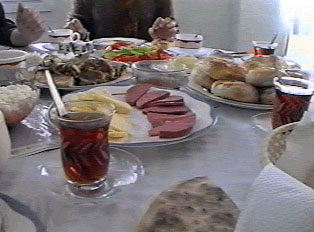LangMedia
Turkish in Turkey
Home Meals

Usually it is the mother or the teenagers who prepare a semi-formal table, even for breakfast. Even if the meal is rushed, it is important to have a nicely set table. A typical breakfast consists of bread, jam, butter, cheese, olives, and milk or hot, black tea (even for children). It is typical to have a variety of cheese and olives, and on weekends or in summers there is often a variety of fresh pastries or bread (for example with walnuts or olives). In some traditional families, it is also common to have certain kinds of home-made soup for breakfast. Lunch takes about a half an hour around noon while dinner begins between 6:00 p.m. and 7:00 p.m. and lasts at least an hour. Dinner usually includes a main dish with vegetables and meat in a soup-like sauce, salad, yogurt, and cooked chilled vegetables. Turkish coffee is a must after each meal, especially dinner. Telling fortunes based on coffee grounds left in the cup often forms the basis of after dinner conversation. In many families, reading a newspaper or watching TV while eating would be considered impolite; rather, meals are a time for family members to touch base with each other.
A guest who has been invited for dinner should arrive close to the time established. Arriving more than 15 minutes late would be considered quite rude. The term "not to come empty-handed" applies; it is appropriate to bring something complementary for the meal, such as dessert or wine. The hostess/host will serve the guest and will ask the guest if s/he would like one thing or another. It is fine for the guest to take only a little bit or say "no, thank you." It is expected that the guest will finish what is on the plate, after which the hostess/host will offer seconds. It is polite to compliment the cook.
Videos
-
"Table Setting"No transcript
-
"Asking for Lemon"Transcript document:
-
"Serving Dessert"Transcript document:
-
"At Breakfast"Transcript document:
